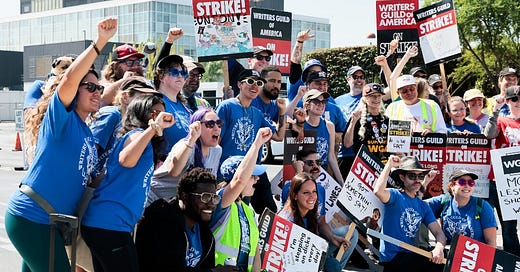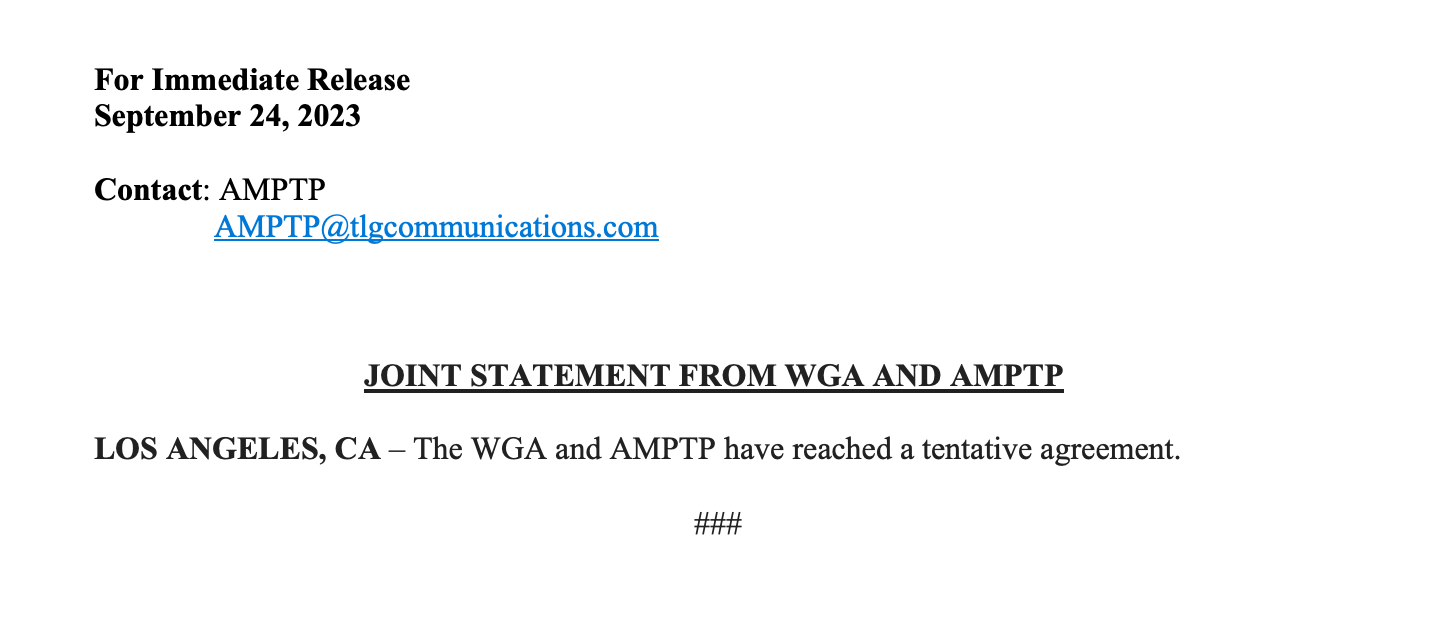I want to start by quoting a couple excerpts from some articles over the past few months.
From Variety in July (emphasis mine):
During an appearance on CNBC’s “Squawk Box” on Thursday morning, Disney CEO Bob Iger said that the writers and actors unions going on strike in Hollywood are not being “realistic” with their expectations.
[…] “It’s very disturbing to me. We’ve talked about disruptive forces on this business and all the challenges we’re facing, the recovery from COVID which is ongoing, it’s not completely back. This is the worst time in the world to add to that disruption,” Iger said. […] “There’s a level of expectation that they have, that is just not realistic. And they are adding to the set of the challenges that this business is already facing that is, quite frankly, very disruptive.”
From the New York Times on Sunday night (emphasis mine):
The Writers Guild of America, which represents more than 11,000 screenwriters, reached a tentative deal on a new contract with entertainment companies on Sunday night, all but ending a 146-day strike that has contributed to a shutdown of television and film production.
In the coming days, guild members will vote on whether to accept the deal, which has much of what they had demanded, including increases in compensation for streaming content, concessions from studios on minimum staffing for television shows, and guarantees that artificial intelligence technology will not encroach on writers’ credits and compensation.
[…] The tentative deal came after several senior company leaders joined the talks directly — among them Robert A. Iger, Disney’s chief executive; Donna Langley, chair of the NBCUniversal Studio Group; Ted Sarandos, Netflix’s co-chief executive; and David Zaslav, who runs Warner Bros. Discovery.
So, to recap, in July, Disney CEO Bob Iger was going around scoffing at the demands that screenwriters and actors were making, and telling them to get real and (presumably) accept whatever crappy deal the studio chiefs were going to offer them. By late September, Disney CEO Bob Iger had personally sat across the table from the Writers Guild of America (which, full disclosure, is a union that many Discourse Blog staffers, including me, belong to) to help seal a deal that meets most of the WGA’s demands.
Interesting!
Here’s another excerpt from the Los Angeles Times (emphasis mine):
One unnamed studio executive reportedly told Deadline, “The endgame is to allow things to drag on until union members start losing their apartments and losing their houses.”
[…]Talks fell apart after an Aug. 22 meeting with the four leading CEOs — Iger, Zaslav, Langley and Sarandos. Representatives for the writers described it as a “lecture” and a browbeating session in which they were pressured to accept an Aug. 11 proposal from the AMPTP.
That Deadline quote was from July. So, two months ago, studio executives were going around town bragging that they were going to make writers homeless. One month ago, the bosses were sitting in meetings trying to order the writers to get in line and sign whatever deal they could. And over this past weekend, those same bosses gathered to sign a deal that the WGA calls “exceptional.”
Well, they would say that, you might be thinking, and that is true. But here’s the totality of what the Alliance of Motion Picture and Television Producers, the group representing the studios, has to say about the deal on its website as of this writing:
LOL. Maybe this is all part of the PR game—a deal looks better to union members if the bosses aren’t seen to be too happy about it, after all—but it’s still funny.
OK, now to the point. What is the thing that got these very powerful studio heads to go from swaggering across Hollywood boasting about how they were going to put writers on the breadline to where we are now?
The answer is simple: strikes work.
The writers went on strike, they stayed on strike, they kept whatever disagreements they might be having private, they made sure that anyone trying to get around the strike would face consequences, they held the line again and again and again, and eventually the studios had to look at each other and say “OK, time to deal.” They became uncomfortably reminded of an essential truth about the relationship between workers and their bosses: that most of the time, bosses don’t actually know how to do anything.
Bob Iger can’t write a script. He can’t plot out a compelling season of television. He has no idea how to make a movie interesting. He is very talented at figuring out how to extract profit from the labor of others, but without his workers, he and all of the other rich dopes he hangs out with are pretty worthless, and once it became clear that the writers weren’t going to budge, Iger and his chums had to figure out how to make them happy enough that they would start generating tons of money for Hollywood again.
It is very hard to pull off a strike, particularly one as long as the WGA strike, but in the end it comes down to a pretty basic principle: stick together, and don’t yield. And the writers stuck together, and they didn’t yield, and now they have won. Strikes work! Feels good.







It should probably also be noted that California saying strikers can get on UI probably added some spice to the proceedings, of course, because the whole "well we'll just starve them out" solution got even less feasible. Of course, a lot of writers aren't in California, so this is still primarily a case of "hey when you stick with your fellow workers you win shit" in my books.
GOD I love the fact that Iger had to go into a meeting and fucking swallow the demands of the writers. I love it forever, I love it eternally, this is such a big worker win and I cannot wait to see more unions getting more wins as things roll on.
Solidarity for-fucking-ever. Wonderful news to start the week.